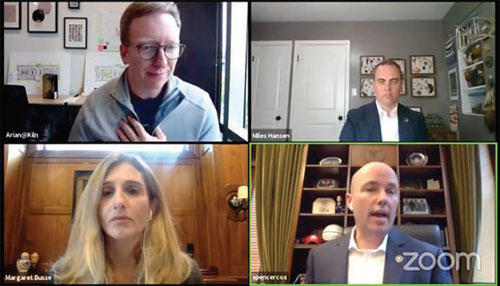By Brice Wallace
“Optimism” and “opportunities” were main themes throughout a recent webinar about getting Utah back to “a new normal.”
Speakers said Utahns’ reactions to the COVID-19 pandemic have left them with positive feelings about how the state will emerge from the coronavirus’ impacts, including how both businesses and individual workers can explore new opportunities.
For example, now is the time for Utah companies to seize the chance to get engaged in the global marketplace, according to Miles Hansen, CEO and president of World Trade Center Utah.
“We all need to recognize that Utah is doing very well, relative to other states and other countries,” Hansen said during the webinar, presented by Kiln.
“That’s a combination of great leadership, great policy and a lot of good fortune as well. Because of the success we’re having, we now are in a unique position where, given the global disruption that is occurring in the economy in other markets, Utah companies have an opportunity to jump in, to re-engage, to look for new opportunities to provide their products and services to generate new revenue, in that new revenue is going to be the long-term driver of our economic recovery.”
World Trade Center Utah has been working to make businesses aware of the resources available to help them identify those new opportunities in global markets, he said.
“Now is the time for companies, as we figure out how to survive. … And let’s use this global disruption and the strong position Utah is in now to go out and help our companies win market share away from companies that have had to retreat a lot more because their areas are not faring as well as Utah has fared up to this point in the crisis.”
For individuals, the “pause” in the economy have given workers time to think about what they want to do professionally and consider whether a change is appropriate, according to Margaret Busse, a social impact and public policy advisor who has worked at state and local levels.
“They may think, ‘You know what? What I was doing before, I didn’t really like anyway,” Busse said.
Many jobs have been lost due to automation and the coronavirus has prompted layoffs and furloughs, she said. “A lot of jobs will come back, but a lot of them won’t,” Busse said.
But public/private partnerships and other avenues can enable people to obtan “microcredentials” on the way to a new career, she suggested.
Likewise, companies adjusting to the “new normal” are seeing an acceleration of trends that already were underway prior to the virus. COVID-19 resulted in “a forced experiment” involving telework, social gatherings and other activities, and companies can learn which ones work and which ones do not as they move forward, she said.
There is a pent-up desire to “make things happen and to do things,” and the insights learned about how to work in different ways can spur entrepreneurship, she said.
“There’s a lot of bad news, but I think the acceleration of certain trends are going to potentially be good news for people as we move forward, and maybe exciting times,” Busse said.
As for optimism, Arian Lewis, founder and CEO of Kiln, said the new normal is “exciting and interesting and challenging.”
“Maybe tech will save us, and maybe government will help save us and maybe we’ll help save ourselves,” he said. “I really feel optimistic, actually. It’s incredible to see the innovation that has already come and that will continue to come.”
That innovation from early-stage tech companies and startups could benefit from government stimulating investment in those companies, he suggested. “We need those jobs, we need that innovation, and it’s an important part of paving the way forward,” Lewis said.
Hansen said Utah has “gone through an incredibly challenging period” and still has significant economic disruption and destruction taking place.
“But,” he said, “I do see us entering a period when we can stabilize, and then Utah is going to be very well-positioned to go out and to come out of this thing with a growth trajectory that I believe will be even better than it was going into this crisis, thanks to the way that we’ve been able to handle things up to this point and the data-driven, nuanced approach we’re going to have moving forward if there are second waves and other disruptions to come.”








